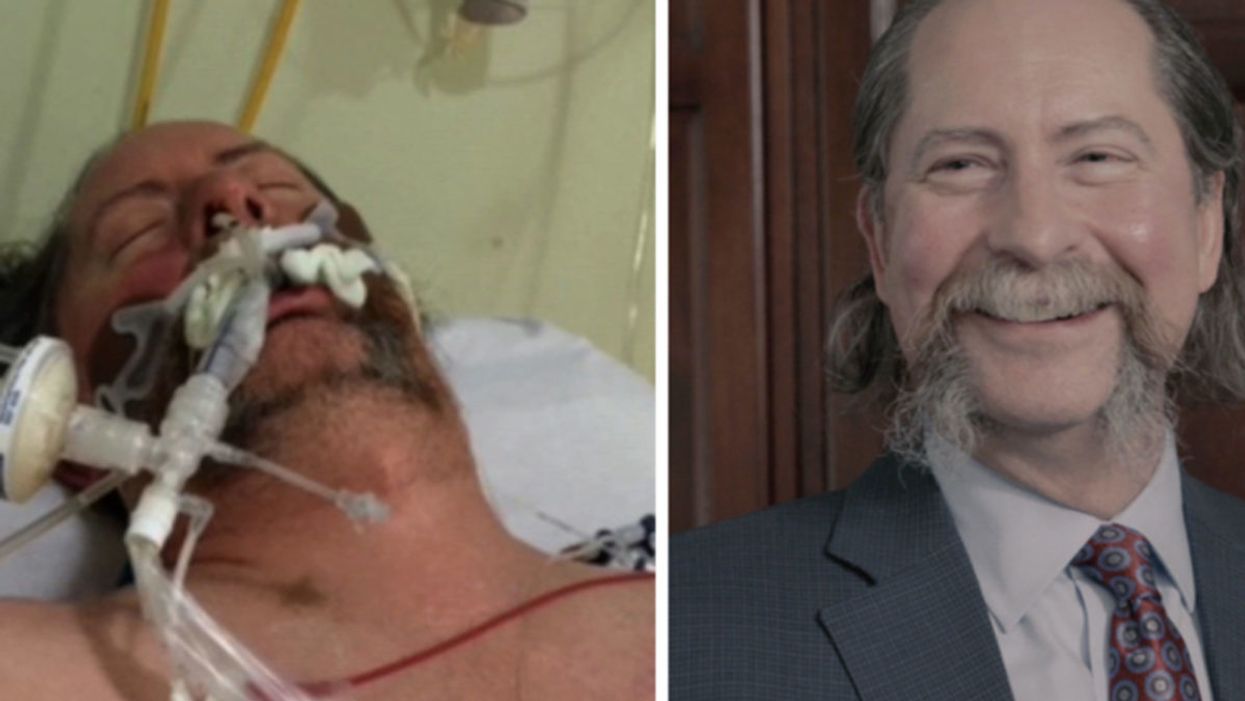I'm a Transplant Surgeon Who Designed the Breakthrough That Saved My Own Life
Kira Peikoff was the editor-in-chief of Leaps.org from 2017 to 2021. As a journalist, her work has appeared in The New York Times, Newsweek, Nautilus, Popular Mechanics, The New York Academy of Sciences, and other outlets. She is also the author of four suspense novels that explore controversial issues arising from scientific innovation: Living Proof, No Time to Die, Die Again Tomorrow, and Mother Knows Best. Peikoff holds a B.A. in Journalism from New York University and an M.S. in Bioethics from Columbia University. She lives in New Jersey with her husband and two young sons. Follow her on Twitter @KiraPeikoff.

Dr. Robert Montgomery, the director of NYU Langone's Transplant Institute, is ironically the recipient of a heart transplant.
[Ed. Note: This is the fourth episode in our Moonshot series, which explores four cutting-edge scientific developments that stand to fundamentally transform our world.]
Kira Peikoff was the editor-in-chief of Leaps.org from 2017 to 2021. As a journalist, her work has appeared in The New York Times, Newsweek, Nautilus, Popular Mechanics, The New York Academy of Sciences, and other outlets. She is also the author of four suspense novels that explore controversial issues arising from scientific innovation: Living Proof, No Time to Die, Die Again Tomorrow, and Mother Knows Best. Peikoff holds a B.A. in Journalism from New York University and an M.S. in Bioethics from Columbia University. She lives in New Jersey with her husband and two young sons. Follow her on Twitter @KiraPeikoff.
Today’s more than 20,000 mental health apps have a wide range of functionalities and business models. Many of them can be useful for depression.
Even before the pandemic created a need for more telehealth options, depression was a hot area of research for app developers. Given the high prevalence of depression and its connection to suicidality — especially among today’s teenagers and young adults who grew up with mobile devices, use them often, and experience these conditions with alarming frequency — apps for depression could be not only useful but lifesaving.
“For people who are not depressed, but have been depressed in the past, the apps can be helpful for maintaining positive thinking and behaviors,” said Andrea K. Wittenborn, PhD, director of the Couple and Family Therapy Doctoral Program and a professor in human development and family studies at Michigan State University. “For people who are mildly to severely depressed, apps can be a useful complement to working with a mental health professional.”
Health and fitness apps, in general, number in the hundreds of thousands. These are driving a market expected to reach $102.45 billion by next year. The mobile mental health app market is a small part of this but still sizable at $500 million, with revenues generated through user health insurance, employers, and direct payments from individuals.
Apps can provide data that health professionals cannot gather on their own. People’s constant interaction with smartphones and wearable devices yields data on many health conditions for millions of patients in their natural environments and while they go about their usual activities. Compared with the in-office measurements of weight and blood pressure and the brevity of doctor-patient interactions, the thousands of data points gathered unobtrusively over an extended time period provide a far better and more detailed picture of the person and their health.
At their most advanced level, apps for mental health, including depression, passively gather data on how the user touches and interacts with the mobile device through changes in digital biomarkers that relate to depressive symptoms and other conditions.
Building on three decades of research since early “apps” were used for delivering treatment manuals to health professionals, today’s more than 20,000 mental health apps have a wide range of functionalities and business models. Many of these apps can be useful for depression.
Some apps primarily provide a virtual connection to a group of mental health professionals employed or contracted by the app. Others have options for meditation, sleeping or, in the case of industry leaders Calm and Headspace, overall well-being. On the cutting edge are apps that detect changes in a person’s use of mobile devices and their interactions with them.
Apps such as AbleTo, Happify Health, and Woebot Health focus on cognitive behavioral therapy, a type of counseling with proven potential to change a person’s behaviors and feelings. “CBT has been demonstrated in innumerable studies over the last several decades to be effective in the treatment of behavioral health conditions such as depression and anxiety disorders,” said Dr. Reena Pande, chief medical officer at AbleTo. “CBT is intended to be delivered as a structured intervention incorporating key elements, including behavioral activation and adaptive thinking strategies.”
These CBT skills help break the negative self-talk (rumination) common in patients with depression. They are taught and reinforced by some self-guided apps, using either artificial intelligence or programmed interactions with users. Apps can address loneliness and isolation through connections with others, even when a symptomatic person doesn’t feel like leaving the house.
At their most advanced level, apps for mental health, including depression, passively gather data on how the user touches and interacts with the mobile device through changes in “digital biomarkers” that can be associated with onset or worsening of depressive symptoms and other cognitive conditions. In one study, Mindstrong Health gathered a year’s worth of data on how people use their smartphones, such as scrolling through articles, typing and clicking. Mindstrong, whose founders include former leaders of the National Institutes of Health, modeled the timing and order of these actions to make assessments that correlated closely with gold-standard tests of cognitive function.
National organizations of mental health professionals have been following the expanding number of available apps over the years with keen interest. App Advisor is an initiative of the American Psychiatric Association that helps psychiatrists and other mental health professionals navigate the issues raised by mobile health technology. App Advisor does not rate or recommend particular apps but rather provides guidance about why apps should be assessed and how health professionals can do this.
A website that does review mental health apps is One Mind Psyber Guide, an independent nonprofit that partners with several national organizations. One Mind users can select among numerous search terms for the condition and therapeutic approach of interest. Apps are rated on a five-point scale, with reviews written by professionals in the field.
Do mental health apps related to depression have the kind of safety and effectiveness data required for medications and other medical interventions? Not always — and not often. Yet the overall results have shown early promise, Wittenborn noted.
“Studies that have attempted to detect depression from smartphone and wearable sensors [during a single session] have ranged in accuracy from about 86 to 89 percent,” Wittenborn said. “Studies that tried to predict changes in depression over time have been less accurate, with accuracy ranging from 59 to 85 percent.”
The Food and Drug Administration encourages the development of apps and has approved a few of them—mostly ones used by health professionals—but it is generally “hands off,” according to the American Psychiatric Association. The FDA has published a list of examples of software (including programming of apps) that it does not plan to regulate because they pose low risk to the public. First on the list is software that helps patients with diagnosed psychiatric conditions, including depression, maintain their behavioral coping skills by providing a “Skill of the Day” technique or message.
On its App Advisor site, the American Psychiatric Association says mental health apps can be dangerous or cause harm in multiple ways, such as by providing false information, overstating the app’s therapeutic value, selling personal data without clearly notifying users, and collecting data that isn’t relevant to mental health.
Although there is currently reason for caution, patients may eventually come to expect mental health professionals to recommend apps, especially as their rating systems, features and capabilities expand. Through such apps, patients might experience more and higher quality interactions with their mental health professionals. “Apps will continue to be refined and become more effective through future research,” said Wittenborn. “They will become more integrated into practice over time.”
Podcast: Has the First 150-Year-Old Already Been Born
In today's podcast episode, Steven Austad explains why we should want to live a long time as long as that involves longer healthspans.
Steven Austad is a pioneer in the field of aging, with over 200 scientific papers and book chapters on pretty much every aspect of biological aging that you could think of. He’s also a strong believer in the potential for anti-aging therapies, and he puts his money where his mouth is. In 2001, he bet a billion dollars that the first person to reach 150-years-old had already been born. I had a chance to talk with Steven for today’s podcast and asked if he still thinks the bet was a good idea, since the oldest person so far (that we know of), Jeanne Calment, died back in 1997. A few days after our conversation, the oldest person in the world, Kane Tanaka, died at 119.
Steven is the Protective Life Endowed Chair in Health Aging Research, a Distinguished Professor and Chair of the Department of Biology at the University of Alabama Birmingham. He's also Senior Scientific Director of the American Federation for Aging Research, which is managing a groundbreaking longevity research trial that started this year. Steven is also a great science communicator with five books, including one that comes out later this year, Methuselah’s Zoo, and he publishes prolifically in national media outlets.
See the rest of his bio linked below in the show notes.
Listen to the Episode
Listen on Apple | Listen on Spotify | Listen on Stitcher | Listen on Amazon | Listen on Google

Steven Austad is featured in the latest episode of Making Sense of Science. He's a distinguished professor of biology at the University of Alabama Birmingham and has a new book due to be published in August, Methuselah's Zoo.
Photo by Steve Wood
Show notes:
2:36 - Steven explains why a particular opossum convinced him to dedicate his career to studying longevity.
6:48 - Steven's billion dollar bet that someone alive today will make it to 150-years-old.
9:15 - The most likely people to make it to 150 (Hint: not men).
10:38 - I ask Steven about Elon Musk’s comments this month that if people lived a really long time, “we’d be stuck with old ideas and society wouldn’t advance.” Steve isn’t so fond of that take.
13:34 - Why women are winning maybe the most important battle of sexes: staying alive. This is an area that Steven has led research on (see show notes).
18:20 - Why women, on average, actually have more morbidities earlier than men, even though they live longer.
23:10 - How the pandemic could affect sex differences in longevity.
24:55 - How often should people work out and get other physical activity to maximize longevity and health span?
29:09 - Steven gave me the latest update on the TAME trial on metformin, and how he and others longevity experts designed this groundbreaking research on longevity not in their offices, not on a zoom call, but in a castle in the Spanish countryside.
32:10 - Which anti-aging therapies are the most promising at this point for future research.
39:32 - The drug cocktail approach to address multiple hallmarks of aging.
41:00 - How to read health news like a scientist.
45:38 - Should we try a Manhattan project for aging?
48:47 - Can Jeff Bezos and Larry Ellison help us live to 150?
Show links:
Steven Austad's bio
Pre-order Steven's new book, Methuselah's Zoo - https://www.amazon.com/dp/B09M2QGRJR/ref=dp-kindle-redirect?_encoding=UTF8&btkr=1
Steven's journal article on Sex Differences in Lifespan - https://pubmed.ncbi.nlm.nih.gov/27304504/
Elon Musk's comments on super longevity "asphyxiating" society - https://www.cnbc.com/2022/04/11/elon-musk-on-avoid...
Steven's article on how to read news articles about health like a pro - https://www.nextavenue.org/how-to-read-health-news...
AFAR's research on Targeting Aging with Metformin (TAME) - https://www.afar.org/tame-trial

